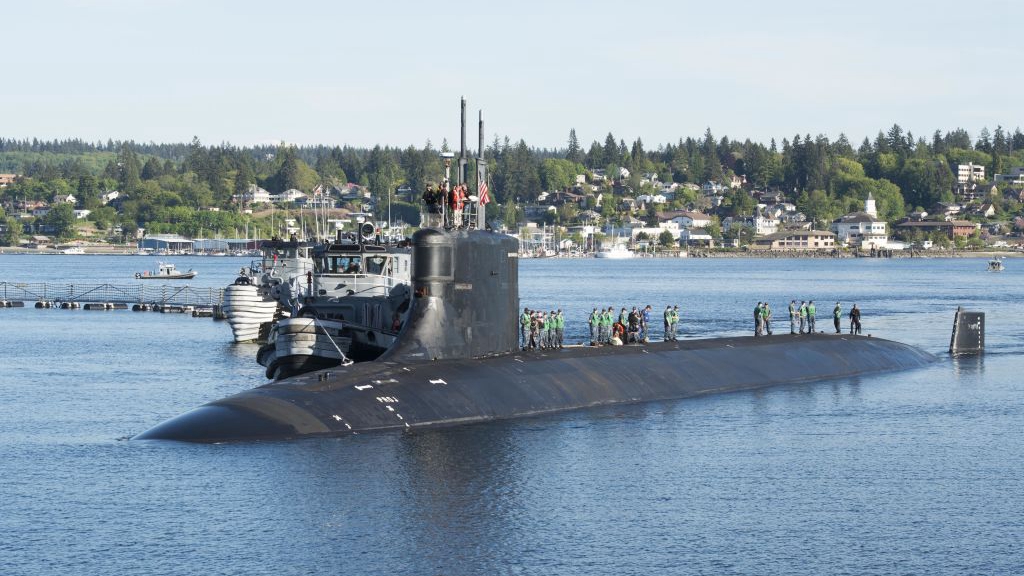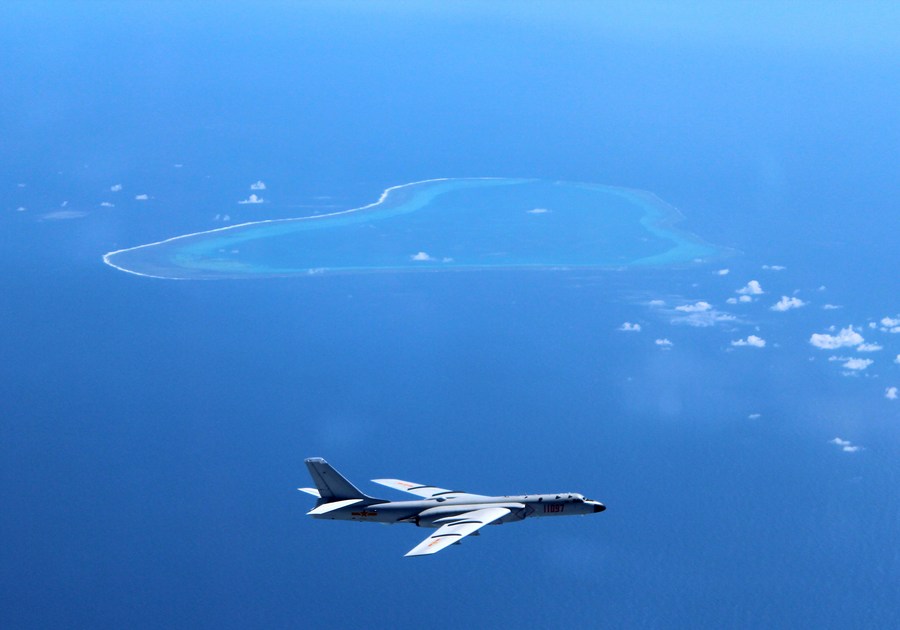
Submariners standing on top of the Seawolf-class fast-attack submarine USS Connecticut in the water at Naval Base Kitsap-Bremerton, Washington, May 7, 2018. /Getty
Submariners standing on top of the Seawolf-class fast-attack submarine USS Connecticut in the water at Naval Base Kitsap-Bremerton, Washington, May 7, 2018. /Getty
Editor's note: Andrew Korybko is a Moscow-based American political analyst. The article reflects the author's opinions and not necessarily those of CGTN.
The U.S. Navy revealed that one of its nuclear submarines recently collided with an unknown object while secretly traveling through the South China Sea (SCS). This accident is significant since it speaks to the regional dangers of the U.S.' saber-rattling in the region, in light of its newfound trilateral military alliance with Australia and the UK, (AUKUS). That surprise pact will see the U.S. and the UK outfit Australia with a fleet of nuclear-powered submarines that will predictably contribute to more of such Western provocations against China.
Chinese Foreign Ministry spokesperson Zhao Lijian reacted to the incident, on October 8, by saying that "We are gravely concerned about the incident. As the party involved, the U.S. should clarify in specific details what happened, including the exact location of the incident, the U.S. side's navigation intention, the details of the incident, the object the submarine struck, whether the collision caused a nuclear leak or damaged local marine environment, etc." He's absolutely right too since the world deserves to urgently know exactly what happened last weekend.
The U.S.' provocative employment of nuclear submarines to secretly infringe on China's maritime territory in the SCS not only runs the risk of triggering a war between these two major powers by miscalculation, but also of causing an ecological catastrophe.
Quite clearly, the U.S. Navy isn't professional enough to operate these vessels, let alone in another country's waters where it doesn't have enough information to safely transit. It's frightening to imagine what might have happened had this accident been worse than it reportedly was.
These fears are heightened by the fact that AUKUS will likely result in those three countries sending more nuclear submarines to the region in the future. Now is the time to prevent that from happening in the interests of the region's military and especially ecological security.
Nobody should violate China's maritime territory, let alone those who are located in the other corner of Asia like Australia, the other side of Eurasia like the UK, or the other side of the planet like the U.S. More accidents will happen if these provocations aren't stopped.

A Chinese H-6K bomber patrolling islands and reefs in the South China Sea. /Xinhua
A Chinese H-6K bomber patrolling islands and reefs in the South China Sea. /Xinhua
It's important to point out that last week's incident still occurred despite the U.S. Navy's decades-long experience of operating such vessels, which makes one wonder how much more often this will happen when Australia finally takes command of its own fleet and is pushed by its AUKUS allies to immediately dispatch it to the SCS. That would be an ecological disaster in the making. If the U.S. can't even avoid such unnecessary and irresponsible accidents, then Australia is bound to have them too, if not repeatedly.
Asia can only remain stable and fulfill its destiny as one of the world's leading economic centers so long as foreign powers stop militarily meddling in this region. Nuclear submarines should never be used as a form of pressure against any country. That's very dangerous as can now be seen, mostly considering the risk of an accident. Even those who might have previously thought very highly of the U.S. Navy's professionalism are likely to question their prior perceptions after what happened. This was truly a shock for the whole world.
America's regional allies must understand the risks that they run by supporting their partner's provocative use of nuclear submarines as instruments of anti-China pressure in their region. These nations depend on the high seas for feeding their people and conducting trade. They cannot afford to have a U.S. nuclear submarine suffer an accident in or near their maritime territory. That would devastate their countries by poisoning a significant portion of their food supply and possibly interfering with freedom of navigation.
The solution is for the U.S. to second guess the wisdom of its dangerous military provocations against China. These don't just threaten China, but also America's regional allies and even its own sailors as last weekend's accident proves.
The progress that was made on correcting the course of China-U.S. relations after this week's meeting between their representatives in Switzerland should be built upon stabilizing the SCS and remove the risk of any ecological threats caused by the U.S.' nuclear submarines within that area.
(If you want to contribute and have specific expertise, please contact us at opinions@cgtn.com.)

